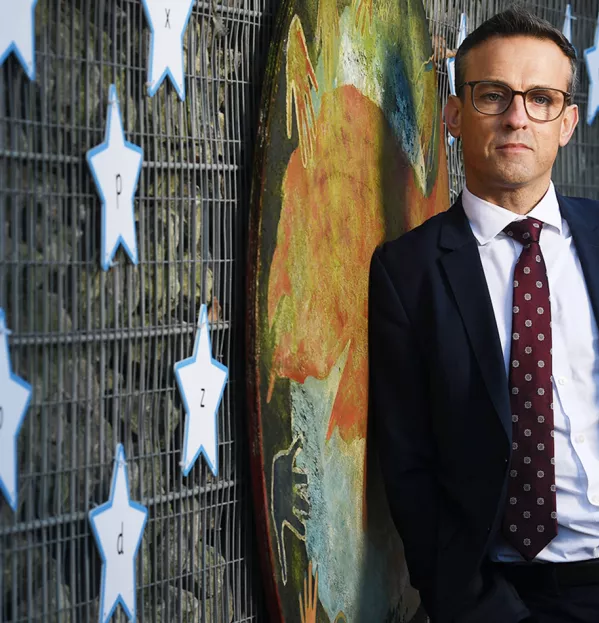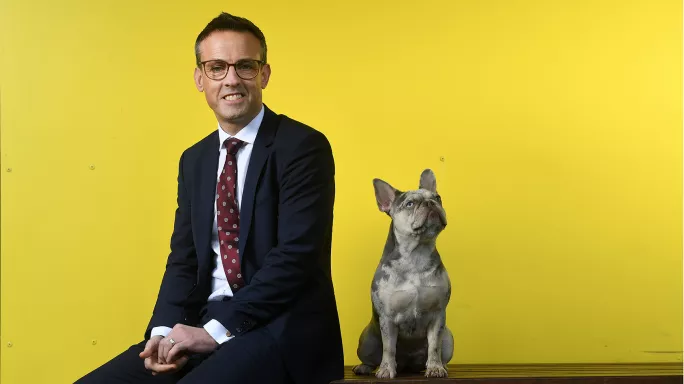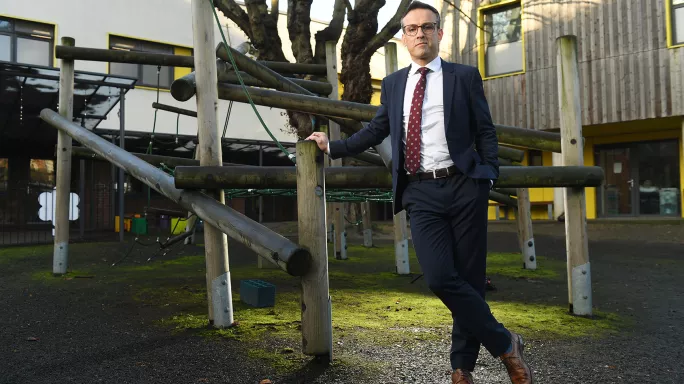
10 questions with...Tom Rees

Tom Rees is the new chief executive of the 42-school Ormiston Academies Trust, based in Birmingham. He was formerly the executive director of programmes at Ambition Institute, a charity that provides professional development to teachers and school leaders.
He speaks to Tes about why his son Freddie has been his biggest influence, the pros and cons of having teacher-parents, and why there is almost nothing more important than recruiting and retaining great teachers.
1. Who was your most memorable teacher and why?
My two most memorable teachers were Mr and Mrs Rees: my mum and dad. Mum was the deputy head at my primary school, and there were lots of benefits to that [and] times when it was more challenging. There is a tape cassette of an Earls Barton Junior School choir practice in 1987, where my mum finally has enough of me talking and you hear her sending me out.
And then Dad was the music teacher at my secondary school. So I experienced school life with parents who were also my teachers.
2. What was the best and worst thing about your time at school?
I’ve got great memories of primary school. We had a really broad education, including sport and music, we went on residentials to France. I remember visiting Bradford, Morris dancing, carnivals - everything you would imagine in a village primary school.
Secondary school is more of a mixed picture. When you get a great teacher, they make the subjects come alive, but when you had weaker teachers it wasn’t such a great experience.
There were times when the school was really in a good place, but there were times when behaviour wasn’t great and moments when it didn’t feel like a safe environment. Now, the way I think about schools is that, fundamentally, our responsibility is to have safe environments where children learn free from distraction and teachers can teach.
3. Why do you work in education?
I left sixth form wanting to do anything other than be a teacher. So I went and worked in a builder’s merchant and I loved it: the working life, the humour, interaction, sales. And, actually, I think there’s quite a lot of sales in education - selling subjects, selling ideas. But after a year, the draw of going to university and teaching came back.
More Tes’ 10 questions...
- Gareth Conyard, joint chief of the Teacher Development Trust
- Melanie Renowden, chief executive officer of the National Institute of Teaching
- Tom Campbell, chief executive officer of E-ACT
I did my first teaching practice in a school in October 1997. It was called Little London Primary School, in a tough inner-city Leeds location. It was very different from anything that I’d experienced in my own school life and I fell in love with that challenge.
The class teacher I was with was called Irene Hinchcliffe and she was just brilliant. And from then on, I just fell in love with it and wanted to work in challenging schools in particular.
4. What are you proudest of in your career and what do you regret?
The things I’m most proud of are the individual differences that you can make to children and then to teachers, through leadership. Sometimes, when you read headlines, you can be duped into thinking everything is terrible. And then you meet teachers who are telling you about what a great time they’re having and you’re reminded that that’s the difference you can make. It’s why the job is worth doing.

I’m really proud to have had the opportunity to work on national policy, like the early career framework and national professional qualifications. And I’m now incredibly proud to be leading Ormiston Academies Trust. It’s a trust with history, values and a track record of taking on some of the biggest educational challenges in the country. It’s built on our founder’s belief that every child can thrive regardless of their background.
But when you look at the inequality gap that still exists in education...we still see that the biggest inequality that exists is the difference in outcomes and experience that kids have at school based on their parents’ salary - that’s still a thing that we haven’t got right. And we’ve been at it for quite a long time as a system...and we haven’t made the shift that we wanted. I think we’ve got a lot more to do.
5. What would you say are the best and worst aspects of our school system today?
So, the best part is where you go to schools in challenging areas and you see brilliance. It’s always both frustrating and hugely inspiring to go and see that, even in this set of unfavourable circumstances, people are doing amazing things. And I think over the past five to 10 years, we’ve seen some real bright spots.
On the worst bits, you can’t really look beyond special educational needs and disabilities (SEND) and inclusion. The SEND system, as it stands, is just not working for kids. We know that the classification is inconsistent. And we know that can lead to...a lowering in expectations and the quality of teaching rather than the extra precision and quality of intervention that the system promises. I think that it’s the single biggest challenge.
6. What will our schools be like in 30 years’ time?
On the one hand, I think we are going to see some quite significant shifts in society and in education, as artificial intelligence develops further and the implications of that become clearer. I also think our educational system has been impervious to change in many ways. Lots of different attempts to reform the system in different ways haven’t led to the transformation that was intended because of the way that the school system is structured.
And sometimes you might think that that’s a bad thing, because it gets in the way of progress, but then we can see that as a positive thing. Because, at times of dramatic shift, it’s managed to stay resilient in the face of difficult challenges.
7. Your own teachers aside, who in education has influenced you the most?
My son Freddie. He was born with Down syndrome. We were relatively young parents and we weren’t expecting it. And then he became very ill in his first year of life and had a thing called infantile spasms, which has a really awful prognosis. We spent a lot of our first year in hospital with Freddie.

He’s now 18 and is just leaving the school system and is an adult. He’s non-verbal and also has autism, and he’s fundamentally changed the way that I see the world.
8. Who would you have in your dream staffroom?
I think we are too obsessed with individuals and celebrity as a society, and so my answer is more about the traits of people. So I would have a diverse group of people who have a knowledge of the world and a passion to make sure that as many children as possible have access to that too. I love working with people, and teachers just instinctively are always thinking about how they can be a bit better tomorrow.
9. If you became education secretary tomorrow, what would be the first thing you would do?
One of the things that education doesn’t need is huge instability. When we think about improving education in the next five to 10 years, we have to think about education as part of a wider set of public services - including health and social care, and universities - within the context of the world as it is at the moment.
There are three things in my manifesto. One is a cross-governmental programme to raise outcomes for kids from disadvantaged backgrounds. This brings into scope health, social care and SEND, alongside curriculum. It doesn’t mean that schools should solve every societal problem, it means that they work in partnership with all those other aspects of public service to deliver better things for kids and families.
The second is committing to a long-term programme for investment in teacher training. There’s almost nothing more important than recruiting and retaining great teachers. And so we can’t afford for it to be a political issue that gets chopped and changed over the next 10 years. It has to be a serious cross-party issue on which there is consensus.
And then, thirdly, I would consolidate the system into a single schools system. As long as we’re caught having two systems, with both academies and local authorities running schools, it makes it really difficult for us to solve some of those bigger things like social care and SEND.
I like the diversity within the academies system. I think it’s really, really important. And I don’t think I would argue for monopolisation where we have just one trust that runs an entire area, because I think diversity is really important. But when you go up a level from that, if you’re trying to solve a problem like SEND and once you look down on the system as it is now, it just becomes really difficult to solve. So for me, it’s about consolidating it so we have a single school system but with diversity of providers within it to bring innovation. And I think that’s where we’ll be able to drive better value for money, as well as improvement.
10. Who’s made the biggest difference to education in the past 12 months?
I just can’t name an individual. I think teaching and education is a team sport. Last year, if you think how difficult it was being in schools with all the additional challenges post-Covid: attendance, behaviour, mental health, along with the pressure to get academic outcomes back to where we want them to be. Anyone working in a school on the front line - they’re the people who made the biggest difference.
You need a Tes subscription to read this article
Subscribe now to read this article and get other subscriber-only content:
- Unlimited access to all Tes magazine content
- Exclusive subscriber-only stories
- Award-winning email newsletters
- Unlimited access to all Tes magazine content
- Exclusive subscriber-only stories
- Award-winning email newsletters
You need a subscription to read this article
Subscribe now to read this article and get other subscriber-only content, including:
- Unlimited access to all Tes magazine content
- Exclusive subscriber-only stories
- Award-winning email newsletters
- Unlimited access to all Tes magazine content
- Exclusive subscriber-only stories
- Award-winning email newsletters



